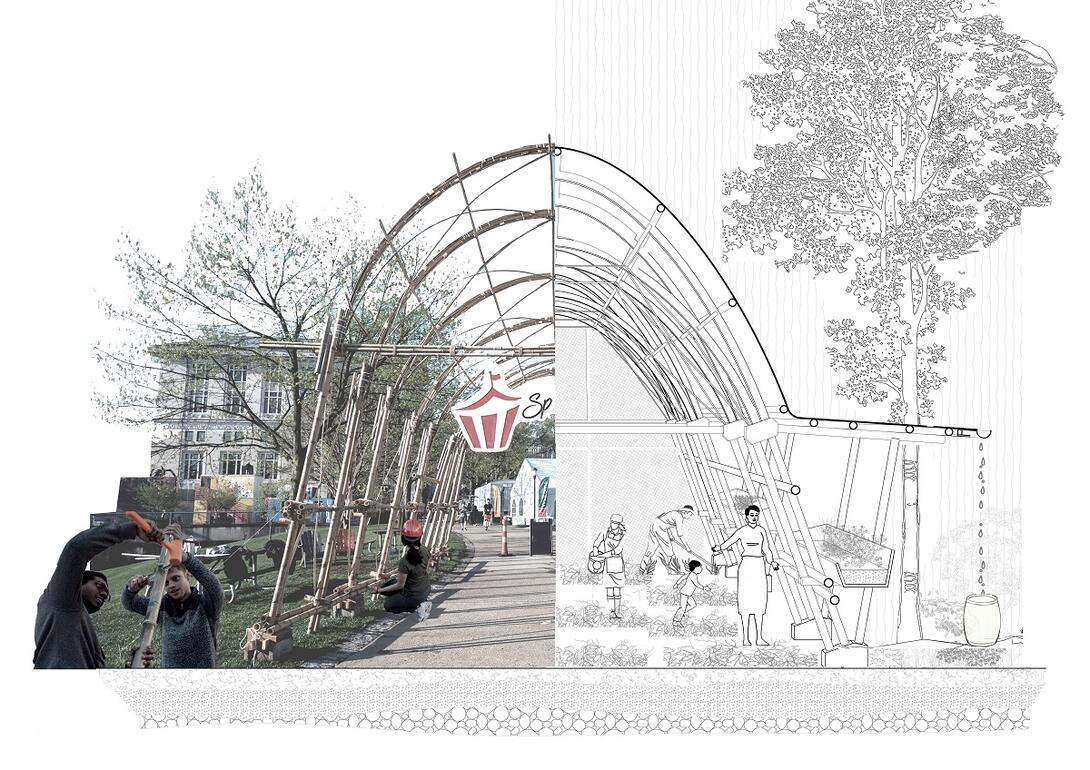PJ Dick Innovation Fund Project Grant: The Second Life Greenhouse Design-Build Project

The Second Life: From Waste to Oasis_ A Greenhouse Design-Build Project Using Bamboo as the Primary Material
Vicki Achnani, Associate Studio Professor, Carnegie Mellon Architecture
In these unprecedented times, our communities need us more than ever, particularly in light of social unrest and the aftermath of the pandemic. The current methods of architectural practice, characterized by the incessant use of carbon-intensive materials, which account for 40% of global emissions, and working in isolation in a studio without user input, clearly indicate that education for the next generation of architects must actively incorporate carbon-conscious construction. Additionally, it should provide opportunities to establish trusting and constructive relationships with the people they design for. Our era behooves that we make our communities resilient, foster alternative local economies, and challenge architectural education to promote circularity and upcycling.
This year-long studio project is carefully curated with the aforementioned aspects in mind by utilizing bamboo that has been repurposed from the previous NOMAS Spring Carnival Pavilion installed on campus. The project aims to set a cogent case of low-carbon practices through a full-scale intervention in the neighborhood, thereby supporting an underserved community. Constructing a greenhouse for the locals, the project exposes students to the delicacies of participatory design. Establishing a new classroom that deviates from the conventions, the students are provided with a comprehensive understanding of the site's subtleties, the intrinsic properties of the materials, and the intricacies of the design-build process.
The project is a milieu that demonstrates the potential of the waste economy and low-carbon material while addressing the pressing issues of climate change and social justice and aims to serve as a catalyst. The process of designing, prototyping, participatory design, systems detailing and responding to a real brief on-site is a meticulous endeavor that extends the sphere of architectural education. Working with bamboo, repurposing materials, direct engagement with the community, and making architectural education more impactful, tacit and responsive to societal needs are important steps that align well with the new pedagogy of the School of Architecture.
Image: The Second Life. Credit: Vicki Achnani
About the Project Lead
Associate Studio Professor
-
Project grants support projects that address the school’s three pedagogical challenges: climate change, social justice and artificial intelligence. The grants support the diverse work of Carnegie Mellon Architecture’s faculty in creative practice, professional practice, artistic practice, funded research, participatory design, design build, curation, scholarship, critical and digital humanities, and more. The intention of the PJ Dick Project Grants Program is to provide support for a variety of projects including faculty seed funds to start a project with the aim of getting external support, to continue work on a project that may not have the option for sponsored research, and to support organizing symposia and conferences at the school.
-
The Faculty Grants Program will award a total of $400,000 over four years and is open to all full time faculty at the school. The 2024 proposals were evaluated by a committee comprised of school head Omar Khan; associate heads Joshua Bard, Mary-Lou Arscott and Kai Gutschow; Erica Cochran Hameen, Director of Diversity, Equity and Inclusion; Theodossis Issaias, Special Faculty; Jenn Joy Wilson, Assistant Dean for Research Development and Sponsored Projects; and Aaron Martin, Associate Director, Institutional Partnerships, College of Fine Arts.
The Faculty Grants Program, established in 2023 by PJ Dick Trumbull Lindy Group, supports faculty research and teaching innovations that address the school’s three pedagogical challenges: climate change, social justice and artificial intelligence. The proposals were assessed on their impact in furthering a faculty member’s research and teaching, their contribution to interrogating the school’s challenges, and their viability to garner further research support, make an impact on the discipline and expand the pedagogy of the school.
